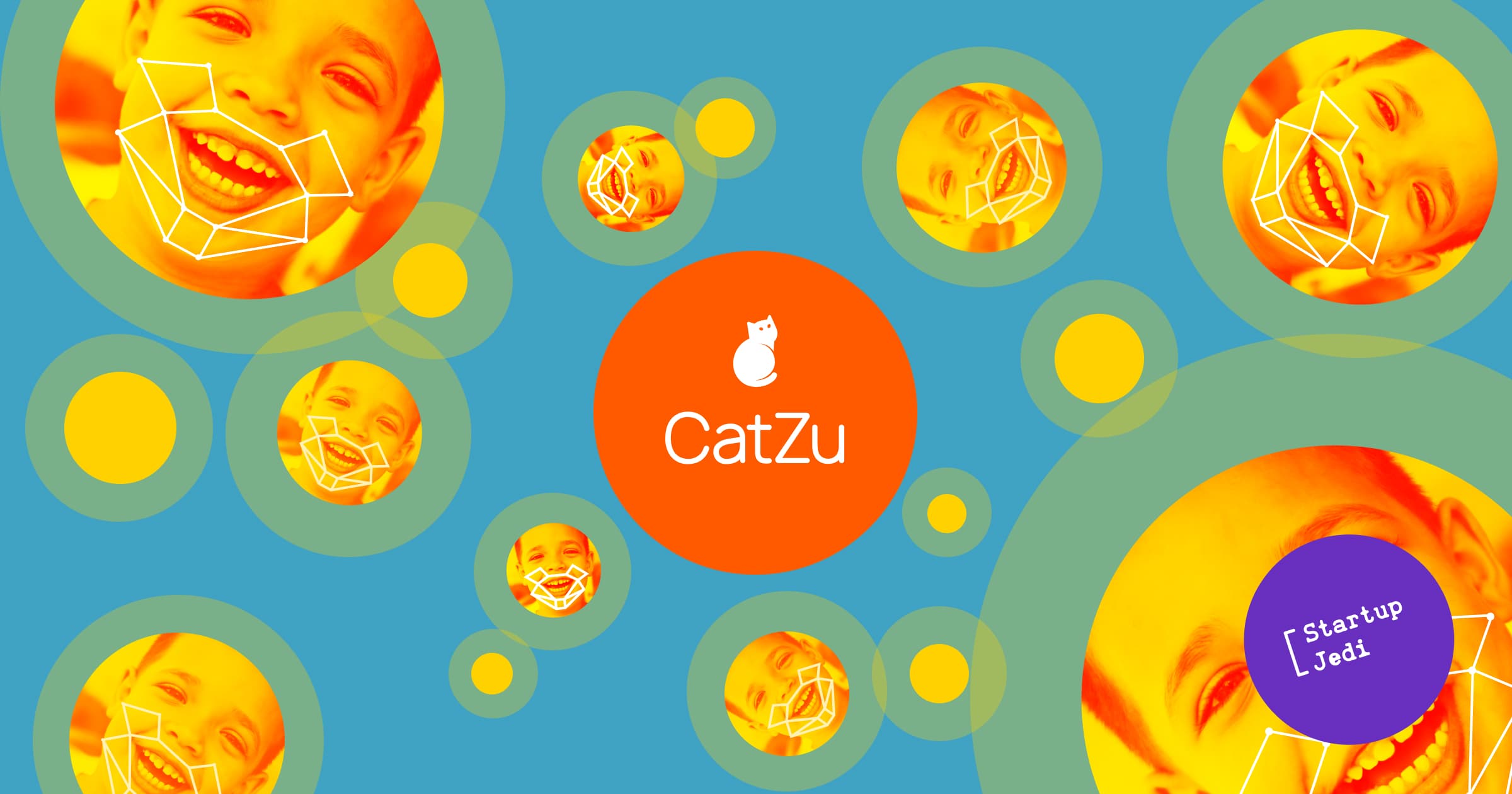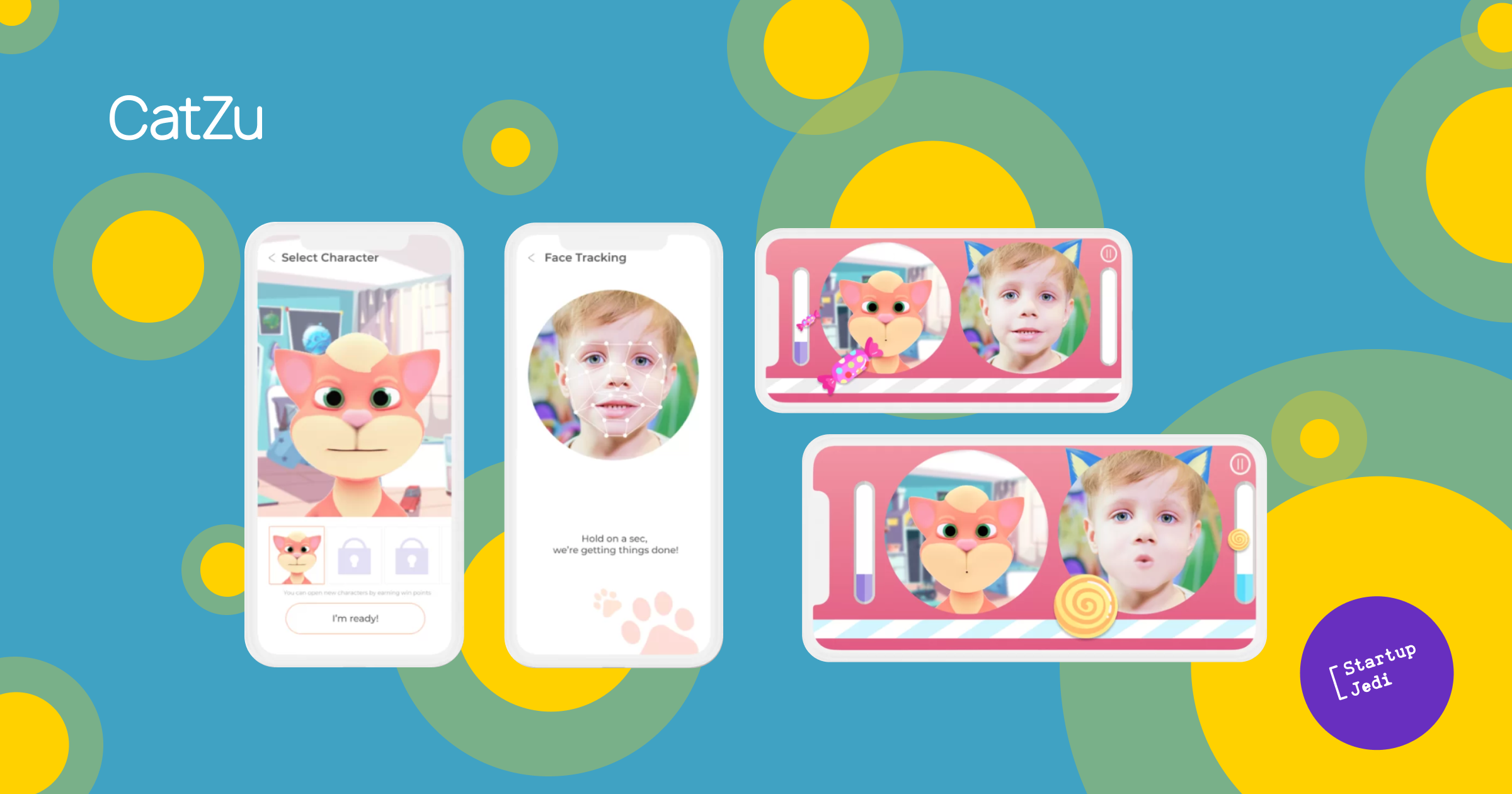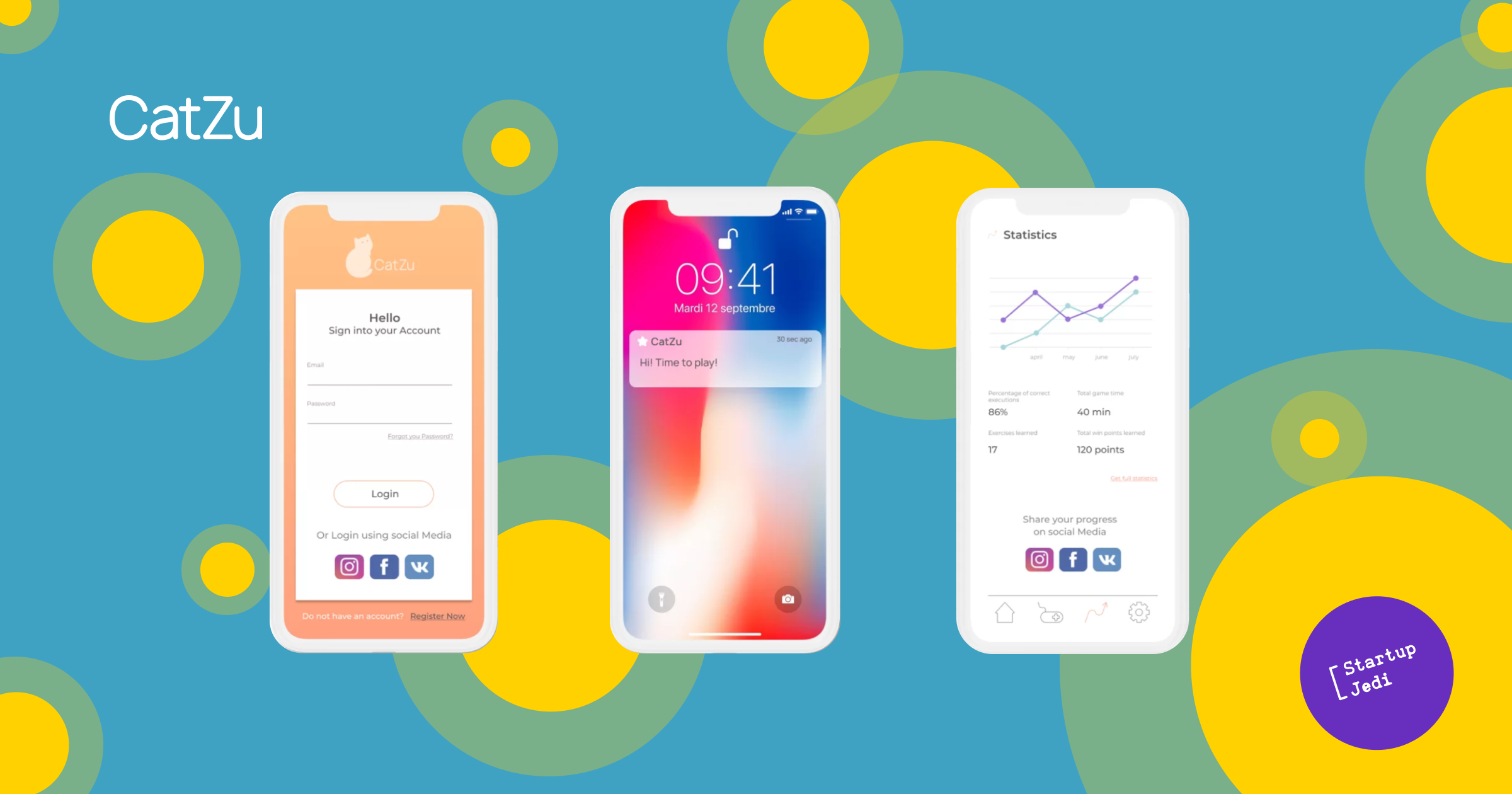
Startup Jedi
We talk to startups and investors, you get the value.
When you were a child, did you have difficulty in speaking properly? And a couple of years later, already at school during English studies were you complaining about “distant” [r], interdental [ ð ] and the difference in pronunciation between [ v ] and [ w ]? To many of us such a story sounds familiar.

Startup Jedi
We talk to startups and investors, you get the value.
The Belarusian startup CatZu is now working on solving this problem. The project was launched in 2019 and will be released in 2020. In this interview the CEO of the project Antonina Sudilovskaya tells us how the idea of the startup has appeared and what its peculiarity, on which market it will work and why problems of preschool children and linguistics students can have the same solutions.
...
It’s an interactive AI mobile assistant for children with impaired pronunciation that can replace a speech therapist at the stage of preparatory articulation exercises. This is a project at the junction between medtech- and edutech-segments.
Having downloaded the application parents and specialists receive an individual set of exercises for oral motor skills development, useful content for children’s speech improvement and reports on the dynamics of the skills that are being formed. A child is offered to play a fun game that can keep his/her attention for the entire cycle of exercises. The child only has to repeat the game character’s movements to achieve certain game goals.
— An innovative component of the application is computer vision technology that allows you to control the quality of the exercises being made in real time without connecting to the Internet, — Antonina says.
The application is planned to analyze the users’ articulation skills in order to propose an individual set of exercises. The service is now working through the the phone’s camera: a child interacts with a funny character who demonstrates various exercises and suggests repeating them, and the system tracks the quality of performance and the progress achieved.
The Cat named Zu accompanies a child during the classes, arranges different challenges and makes pleasant surprises for the child’s efforts. Children will associate this name with fun-filled logopedics. Why was a cat chosen? Antonina communicated with many parents, asked them which characters or animals their children liked; the most popular answer was kitties. That’s how the cat became the application’s “presenter”.
The app’s aim may seem to “replace” a speech therapist, but it is not so. No one can replace real lessons, the application only helps the child to achieve progress faster.
It’s important to mention that the app users don’t need consultation with a speech therapist to start doing exercises, the exercises can not harm. The first release will provide a basic set of exercises that anyone who wants to improve their oral motor skills can perform. These exercises will help to activate muscle tone of the articulation organs and affect favorably the speech quality, its clarity and intelligibility.
— Additional consultation with a speech therapist is not required, because such exercises are not harmful, — Antonina explains. — These are not coercive actions. Everyone fulfills them and moves to success according to their individual abilities. Such a complex of exercises will be useful not only for children with motor speech disorders, but also for adults with a heavy speech load (whose work deals mainly with speeches, communication, etc.) and for anyone who wants to improve their diction. You can use this app to support the articulation tone at any age.
But the team’s work doesn’t end here. New tasks and pronunciation exercises will be introduced as a part of subscription:
— A diagnostic complex will be built over some time. It will select the tasks necessary for the child according to his/her motor skills and make them more complicated as soon as certain skills are developed. At the same time, parents will receive a report on the dynamics of the child’s motor skills. This diagnostics will be also presented with minor changes in the version for the speech restoration after strokes, injuries and operations.
...
Antonina Sudilovskaya, the project’s author and a teacher-defectologist by education, has devoted a significant part of her life to children with special needs. She firmly believes that there are no hopeless children. If remedial exercises are carried out systematically and regularly, the result will definitely come. And the higher the frequency of such exercises is, the faster the result will be achieved.
- Therefore, an important component of the remedial process is not only about stationary classes with a specialist, but also about applying the acquired skills in everyday life, at home, and in the family. It was the moment when difficulties always appeared: not all parents had the opportunity to carry out tasks for speech improvement at home, — Antonina told us. — So I spent too much time describing various methods of work for each child and often it was only a waste of my time. Many of my colleagues still experience similar difficulties.
Antonina took IT courses when she was on maternity leave and accidentally got into a startup that was creating sign-language translators based on computer vision. And it was there that Antonina got acquainted with modern technologies in practice and realized what opportunities they carry for speech-language pathology.
- Thus I came up with the idea to automate some speech therapy processes, make them understandable for parents, interesting for children and useful for specialists.
...
The idea of the project is still being improved, but the very decision of its creation had come about six months before the development process was started. The official start took place at the hackathon for social projects Social Weekend, that was then the team formed.
- Participation in Social Weekend motivated us and triggered the project’s start. During this contest both our project’s name and product’s prototype were born. Still, it was difficult to call the latter a working one, but, in general, it became a great experience, as a result of which we received many useful pieces of advice from experts from various industry fields and gained enthusiasm for the project’s implementation. We reached the finals and received financial support from Yuri Melnichek. With that money we bought tablets and gave them out in four educational institutions in Minsk.
...
A working prototype of the application has been developed already, it is installed on the tablets mentioned above and is now being tested. The recognition accuracy of mouth movements is 98.5%. The app will be constantly updated and improved.
After discussion with programmers the team realized that the first most accessible block for implementation was a comlex of articulation gymnastics. It is always an introduction to any pronunciation exercise. So this became the starting point for building SLP (speech-language pathology) ecosystem which will be valuable for children, parents and specialists.
The service has been developed only at the founders’ own expense.

The application’s full release is scheduled for 2020. It will include:
• more than 30 articulation exercises;
• a diagnostic model that determines the status of the child’s oral motor skills;
• educational content for parents;
• several variants of gameplays.
The current version is designed for children with speech disorders, but the founders perceive the product wider. In the long run CatZu will be useful for anyone who studies foreign languages and needs to train a speech apparatus, as well as for people who restore speech after a stroke.
— We’re planning to take the niche of mobile interactive assistants in the field of inclusive education and rehabilitation, — Antonina says. — Our expectations are banal: we are eager to build a successful business.
...
The application’s market is quite big, considering the team’s long-term plans. If talking about the plans for the next year or two, first of all children who need regular speech therapy are taken into account.
— There is small competition in the logopedic segment, — Antonina says and specifies that approximately thirty mobile applications are working in similar subjects. — However, their number of downloads and customer retention is small, while the number of children needing regular speech therapy assistance is more than 200 million in the world. This happens due to the wrong content delivery and the lack of feedback about children’s movements from the application’s side. In fact, they only show exercises, but don’t see what happens to a child on the other side of the screen. We use computer vision technology to hold attention. This is our competitive advantage, — Antonina Sudilovskaya ads.
As for monetization, the project is going to develop through paid subscription, which will cost $ 9.99 per month. Antonina talked to potential clients — parents of speech impaired children — and asked them whether they were ready to purchase an application that would help their child to achieve progress faster and if they agreed to buy an app, so the next question was for how much. As a result, it turned out that two thirds of parents agreed to pay, and to many of them the price was not so important, efficiency of the application came first.
Furthermore, the product will be adjusted to the B2B market in the future: it will be achieved through the development of software for clinics, where stroke patients are rehabilitated, and for educational institutions.
As for the market, the project is primarily aimed at Belarus, Russia, the United Kingdom, the United States, and Canada, but geography will expand.
— We’re negotiating with medical and educational institutions of Western Europe and studying the demand for such a product. At present there is interest from German and Italian institutions. — Antonina announces.

Surprisingly, since the application is related to the development of speech apparatus, exercises themselves do not require translation, which means that the application can be easily adapted to the market of any country. Exercises are universal for any language. The teacher suggests doing simple exercises.
Take out your language. Lift it up. Then turn it in different directions. Bite your lower lip. Then the upper one.
— What language group does it look like? None, — Antonina says. — These are only exercises, which are designed to strengthen the articulation organs and improve their mobility. People usually see the connection between exercises and a beautiful figure, but not always between exercises and beautiful speech.
The project’s CEO notes:
— When we speak, we make a lot of precise micro movements. A person with preserved motor skills does these movements spontaneously, automatically. For some reason, children and adults may not be able to develop these skills. Therefore, to improve articulation, special exercises are required. It also happens that motor skills are preserved and it is reflected in clear diction, but some movements are fixed incorrectly, for example, with a throat sound [r], the root rises and vibrates instead of the tip of the tongue. So, in this case there are no broken motor skills, but only an incorrectly fixed movement. To correct this, a person needs to remember a proper movement and to get rid of the old habit. To develop the correct motor stereotype multiple exercises are needed. As the articulatory apparatus is ready, the sound will either go on its own, or a small help from a speech therapist with the use of spatulas and other instrumental methods will be required.
There is also content for parents in the app, it is presented in Russian and English. In the future, the content will be available in other European and Eastern languages. The same direction will be developed after the introduction of verbal tasks.
...
The startup develops a product based on computer vision with the use of neural networks. At first glance, it seems that it should have taken a lot of effort to form a team. Nevertheless, Antonina managed to find a rather big team for the startup: now 6 specialists are working on the project:
— There was low staff turnover, especially at the very beginning, but now everything has stabilized. My previous work experience, which was connected with computer vision and machine training, helped me find team members, some of them came from there. Networking during the Social Weekend hackathon and Data fest 2019 have also assisted a lot. Now there are 6 people in the team. They are excellent specialists from various development fields: neural network engineers, an ios/android-developer, a UX/UI/3D-designer, a 2d-artist. I am responsible for domain expertise.
CatZu has recently taken part in a three-week acceleration program Startup Training Camp. Participants received expert reviews from industry representatives and members of the Startup Training Camp team. After the pitch session and teams’ work with experts a Demo Day took place.
— Startup Training Camp has become excellent experience for our team and also an opportunity to get acquainted with the startup ecosystem of Belarus, — Antonina admits.
Facebook: facebook.com/StartupJedi/
Telegram: t.me/Startup_Jedi
Twitter: twitter.com/startup_jedi
Comments